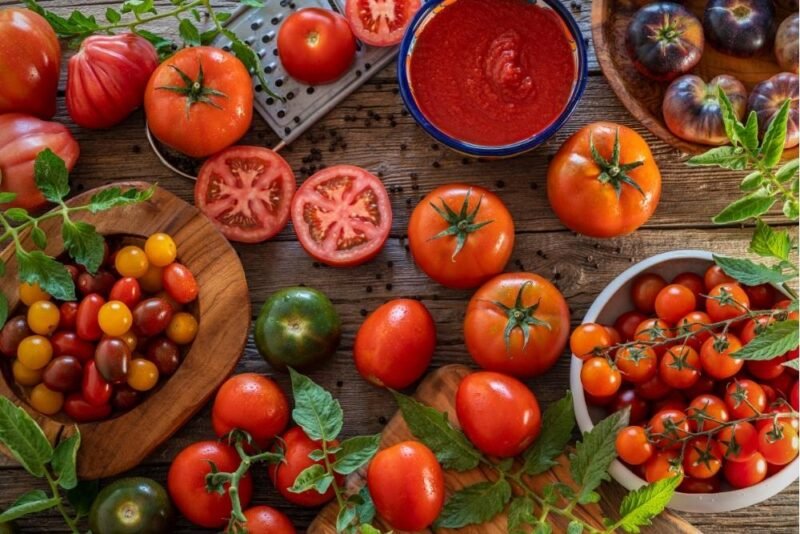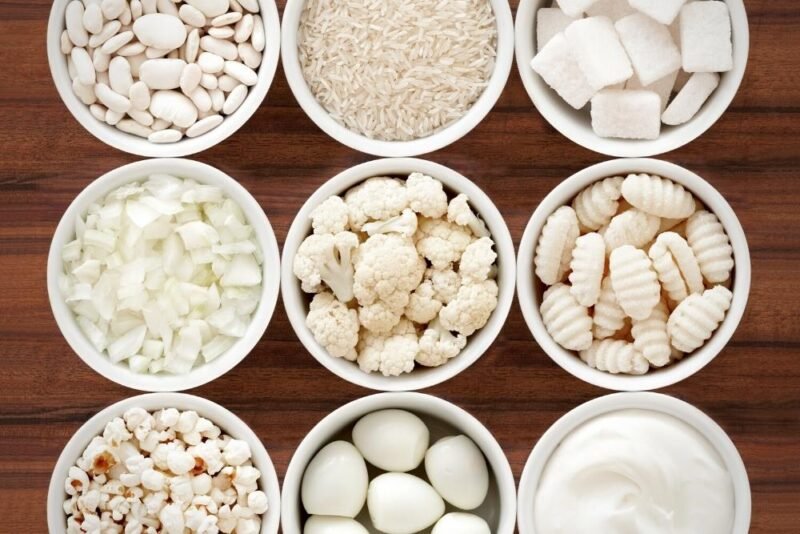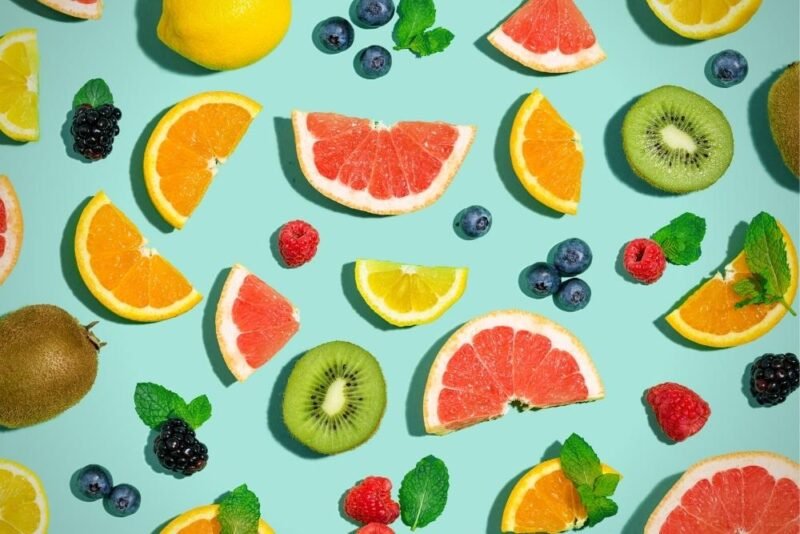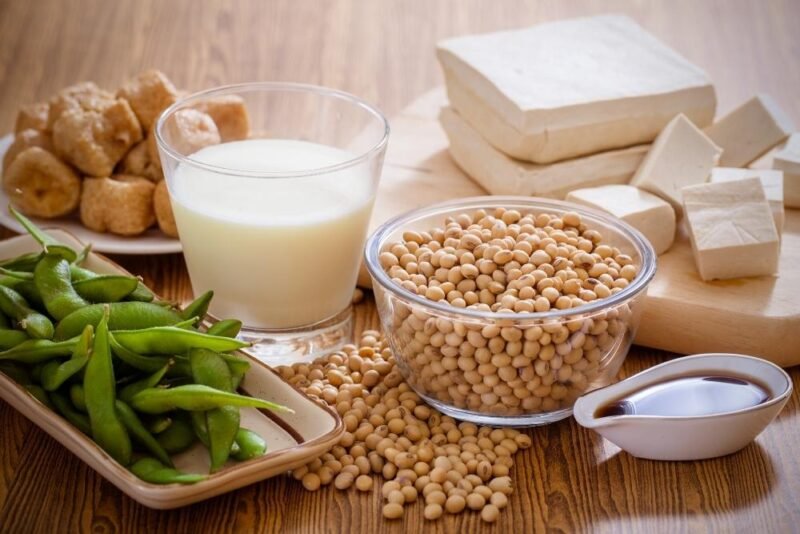
There are few things I love more than a food myth. More specifically, busting a food myth. In today’s post, I want to bust a few myths for you, including a few that have a lot of dogma behind them. I’m also including links to some of my past article for The Seattle Times or The Washington Post on these topics (possible paywalls…sorry). Enjoy!
Myth 1: You should never refrigerate tomatoes
That’s true some of the time, but not all of the time. It depends on where your tomatoes came from — the garden, the farmer’s market, or the grocery store.
If your tomatoes came from your backyard — or from a farmers market where you trust they haven’t been refrigerated—store them at room temperature if they still need to ripen, but store ripe tomatoes in the refrigerator and eat within three days for best quality, letting them come to room temperature first. The quality of ripe tomatoes will deteriorate more at room temperature than when stored briefly in the refrigerator.
If your tomatoes come from anywhere else (i.e., a grocery store), assume they have already been refrigerated. Store them in the refrigerator until you’re ready to use them.
If you want to geek out more on these tomato factoids, I fully credit J. Kenji Lopez-Alt (author of the excellent and geek-worthy cookbook “The Food Lab) and his Serious Eats column on the topic. [1]

Myth 2: You should avoid white foods
Actually, a number of white foods are full of nutrition, and could even be called superfoods! These include cauliflower, garlic and white button mushrooms, not to mention bananas, pears, white peaches and nectarines, jicama, parsnips, ginger and even the humble potato.
- Cauliflower. A member of the super-healthy, phytonutrient packed cruciferous family, along with broccoli and kale, which get all the credit. Some of their phytonutrients have anti-inflammatory and anti-cancer properties. Try it roasted.
- Garlic. Just like the cruciferous family, the allium family, which includes garlic, onions, leeks, shallots and scallions rightfully deserve superfood status. The phytonutrients in garlic may help protect us against heart disease, chronic inflammation and may even slow the development of several types of cancer. When you chop or mince garlic, let it sit for 10 minutes before adding it to what you’re cooking to boost the production of beneficial compounds.
- White mushrooms. Mushrooms include a type of fiber that may help keep your blood sugar and cholesterol levels healthy, as well as antioxidants. They also offer that savory umami taste that makes food more delicious, and they can even act as a stand-in for meat in some recipes.
I wrote an article for the Washington Post [2] that gives lots more information on these superfoods.

Myth 3: You shouldn’t cook with extra virgin olive oil
The fact is that quality EVOO is safe — and delicious — to cook with at any temperature generally used in the home kitchen. You can even bake with it! It’s true that EVOO has a lower “smoke point” (the point when an oil starts to smoke and break down and produce unhealthful free radicals) than refined oils like canola oil, vegetable oils and light olive oil, its smoke point is high enough to be a healthful choice for almost all types of cooking we do at home. Mediterranean countries, especially Greece, cook everything in extra-virgin olive oil.
Smoke point depends partly on the quality, age and condition of the oil. Good-quality EVOO is safe in a range of 350-410 degrees, in part because it is rich in antioxidants, which protect the oil from becoming damaged when heated. Poor quality oil, or oil that has gone rancid, will have a lower smoke point.
I debunked this myth (and a handful of other olive oil myths) in The Seattle Times [3].

Myth 4: Coconut oil and butter are good for you
No, butter’s not back, and coconut oil doesn’t deserve its health halo. These saturated fats are fine in moderation from a culinary perspective, but they don’t do anything for your health. There’ve been a lot of headlines saying that saturated fat’s not “as bad for you” as was once thought, or that coconut oil is healthy because it “behaves” differently than other saturated fats when we eat it.
The fact is that saturated fat does still raise cholesterol and there’s no research to back up the claims made in favor of coconut oil. Basically, the Emperor has no clothes. From a culinary perspective, I think both coconut oil and butter have their place in the kitchen, but just don’t consider them health foods. You’re much better off using olive oil.
For more, see my Seattle Times column on butter [4], and my column on coconut oil [5].

Myth 5: Fruit has too much sugar OR fruit is a “free” food
Fruit contains natural sugar, but that’s not the same thing as the added sugar that, yes, we should avoid going overboard on. But, fruit is generally higher in carbs and calories than vegetables, so even though we should “eat our fruits and veggies,” veggies win.
Most of us have a sweet tooth, because that was our first taste to develop as babies. Fruit is fabulous, and it nature’s perfect healthy sweet. Nutrient-wise, fruit is similar to vegetables, full of vitamins, minerals, phytonutrients, fiber and water. But…it has more carbs. So if you’re more active, you might benefit from more fruit. Less active, less fruit.
You can find much more information in an article I wrote for The Seattle Times [6].

Bonus food myth: Soy foods are unhealthy (and cause cancer)
The fact is that traditional soy foods are an excellent source of plant-based protein, and have been found “not guilty” of the health crimes they’ve been charged with. The jury’s still out on the highly processed soy found in protein powders and energy bars. What people tend to be worried about are phytoestrogens. One type of phytonutrients in soy, isoflavones, is also a phytoestrogen — a plant compound that weakly mimics the effect of the hormone estrogen. This once raised concerns that eating soy might increase breast cancer risk.
The American Cancer Society says the evidence indicates that soy foods are safe and possibly beneficial. When eaten regularly, isoflavones have been linked to lower risk of breast and prostate cancer, as well as heart disease, type 2 diabetes and osteoporosis. However, it’s best to avoid high doses of isoflavones in supplement form, and the jury’s out on the soy protein isolate found in many energy bars and soy “meats.” Learn more in my Seattle Times article [7] on plant proteins.
As an extra, extra bonus, here are links to articles I’ve written on two very myth-worthy topics, gluten and low-carb diets:
- “Avoiding gluten? Odds are you shouldn’t [8].” (Seattle Times)
- “Low-carb vs. low fat: New research says it doesn’t really matter [9].” (Washington Post)
Carrie Dennett [10], MPH, RDN, is a Pacific Northwest-based registered dietitian nutritionist, freelance writer, intuitive eating counselor, author [11], and speaker. Her superpowers include busting nutrition myths and empowering women to feel better in their bodies and make food choices that support pleasure, nutrition and health. This post is for informational purposes only and does not constitute individualized nutrition or medical advice.
Seeking 1-on-1 nutrition counseling? Carrie offers a 6-month Food & Body program [12] (intuitive eating, body image, mindfulness, self-compassion) and a 4-month IBS management program [13] (low-FODMAP diet coaching with an emphasis on increasing food freedom). Visit the links to learn more and book a free intro call to see if the program is a good fit, and if we’re a good fit!